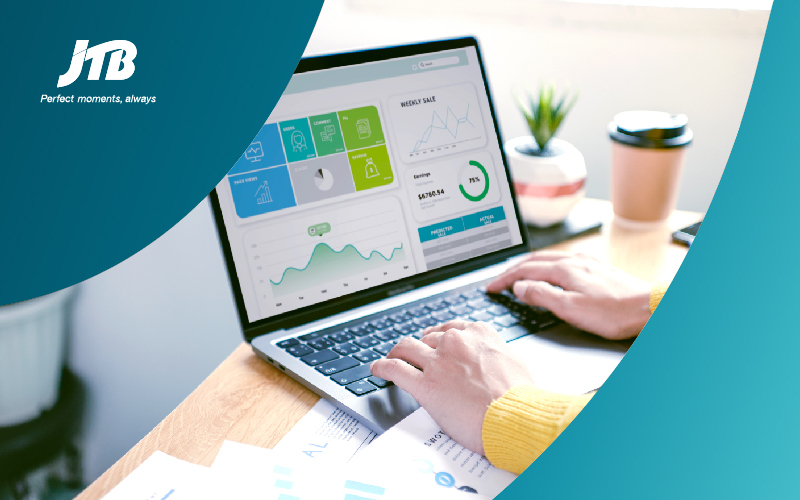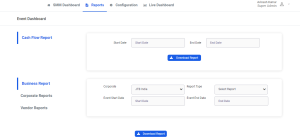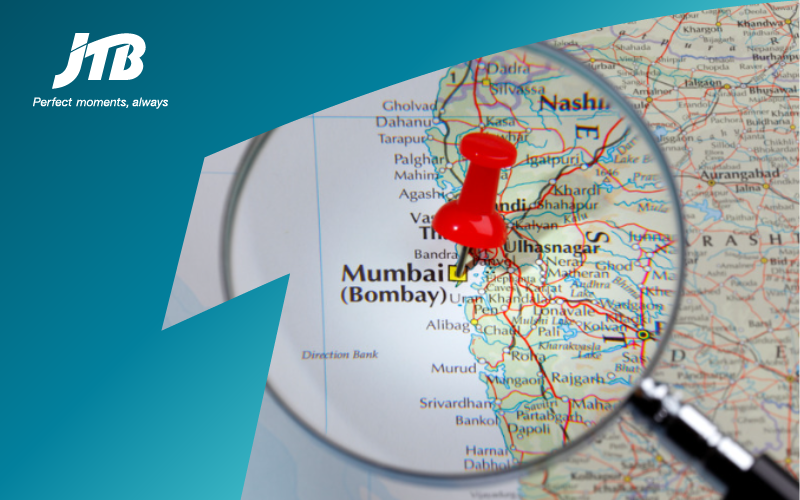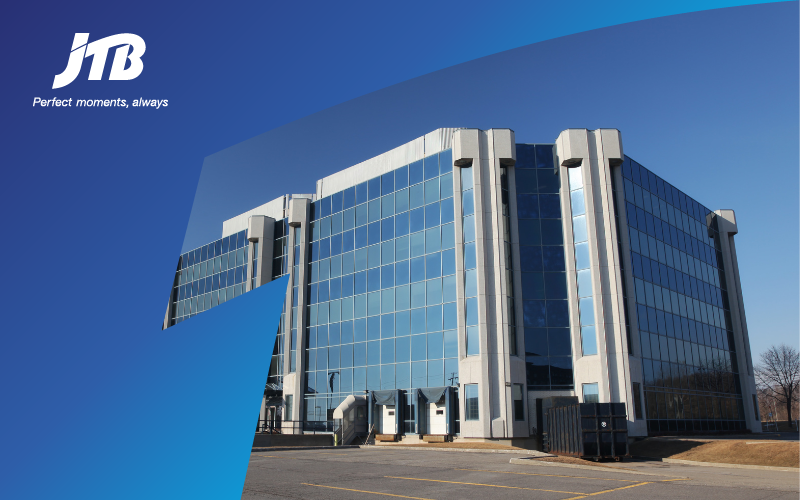Using event data analytics in event management has become vital for driving success by offering valuable insights into attendee behavior and preferences. Moreover, event planners increasingly acknowledge the pivotal role of data-driven insights in orchestrating successful events.
But how exactly can leveraging data analytics benefit them?
By harnessing analytics, planners can optimise every aspect of their event planning and execution. Additionally, JTB India, renowned for innovative event management solutions, offers JTB Connect, a modern technology platform. This tool empowers planners with robust data analytics capabilities, enabling them to enhance attendee experiences, increase ROI, and achieve event objectives with precision.
However, do you know how to collect the data at your event? How to analyse it?
Let’s dive in and understand what data analytics in event management entails, the key benefits of data-driven insights for events, types of event data analytics, measure event success metrics, and best practices for harnessing analytics tools in event management to drive your business success and innovation in the event industry.
What is Event Data Analytics?
Event data analytics refers to the systematic process of gathering, analysing, and interpreting data derived from various facets of an event. This data encompasses a wide range of metrics, including attendee interactions, engagement levels, feedback, and preferences.
By harnessing the power of data analytics, organisers can optimise every aspect of their event planning and execution. From venue selection to marketing strategies and attendee engagement initiatives, data-driven insights enable organisers to make informed choices that enhance the overall event experience.
For example, analysing registration data can help identify popular sessions or topics, allowing planners to allocate resources effectively.
Furthermore, event data analytics empowers event personalization to maximize ROI and achieve event objectives with precision. This analytical approach enables organisers to make data-driven decisions that drive success and innovation in the event industry. Now, let’s have a look at the benefits of data analytics in event management.
Key Benefits of Data-Driven Insights for Events
Data-driven insights offer numerous benefits for events, empowering planners to make informed decisions and enhance overall event success. By leveraging data analytics, event planners can achieve the following key benefits:
- Improved decision-making: Data-driven insights provide event planners with valuable information at every stage of event planning and execution. By analyzing data on attendee demographics, preferences, and engagement, planners can make informed decisions regarding venue selection, content creation, and marketing strategies.
- Enhanced attendee experience: Analysing attendee data enables event planners to personalise event experiences, leading to higher levels of satisfaction and engagement. By understanding attendee preferences and behaviour, planners can tailor event offerings to meet the needs and interests of attendees, resulting in a more memorable and impactful experience.
- Cost optimization: Data analytics can identify cost-saving opportunities and optimise budget allocation for maximum ROI. By analysing data on resource utilisation, attendance patterns, and vendor performance, event planners can identify areas where costs can be reduced or reallocated to achieve better outcomes while maintaining quality.
- Measurable outcomes: Data-driven insights enable event planners to measure the success of events based on predefined KPIs and objectives. By tracking key metrics such as attendance rates, session engagement, and attendee feedback, planners can evaluate the effectiveness of their event strategies and make adjustments as needed to improve future events.
JTB India’s expertise in leveraging data analytics through JTB Connect further enhances these benefits. With JTB Connect’s advanced analytics capabilities, event planners can gain actionable insights to drive decision-making, personalise attendee experiences, optimise costs, and measure event success effectively.
By harnessing the power of data-driven insights, event planners can elevate their events to new heights of success and achieve their objectives with confidence.
Types of Data Analytics for Events
Data analytics plays a pivotal role in ensuring the success of events by providing valuable insights and optimization opportunities across the event lifecycle.
Pre-event Analytics
Pre-event analytics involves leveraging data to understand audience demographics, preferences, and behaviour. By segmenting attendees based on factors such as industry, job role, or interests, event planners can tailor marketing strategies and content to resonate with specific target audiences. Market research and trend analysis further inform event planning decisions, helping organisers stay ahead of emerging trends and anticipate attendee needs.
For example, a technology conference organiser may use data from previous events to identify trends in attendee demographics and interests. By analysing registration data, session preferences, and survey feedback, the organiser can tailor the conference agenda to better meet the needs and preferences of attendees, ultimately driving higher engagement and satisfaction levels.
On-site Analytics
During events, real-time analytics come into play to monitor attendee behaviour and engagement levels. Through technologies like RFID badges, mobile event apps, and beacon technology, organisers can track attendee movement, session attendance, and interactions with event content. This real-time data allows for dynamic adjustments to event programming, such as reallocating resources to popular sessions or addressing logistical issues as they arise.
For instance, at a trade show, organisers may use beacon technology to track attendee movement across the exhibition floor. By analysing data on booth visits, session attendance, and interaction with exhibitor materials, organisers can identify popular areas of interest and adjust event logistics in real time to optimise attendee experiences.
Post-event Analytics
Post-event analytics are essential for evaluating event success and informing future planning efforts. By analysing metrics such as attendee satisfaction surveys, session feedback, and post-event surveys, organisers can measure the event’s ROI and identify areas for improvement. Understanding attendee sentiment and preferences gleaned from post-event data enables organisers to refine event strategies, enhance the attendee experience, and drive greater value in subsequent events.
JTB Connect offers a comprehensive suite of analytics capabilities throughout the event lifecycle, enabling organisers to harness the power of data to make informed decisions and optimise event outcomes. From pre-event audience insights to real-time engagement tracking and post-event performance analysis, JTB Connect empowers event planners with the tools they need to deliver exceptional events that resonate with attendees and drive business success.
Tools and Technologies for Event Data Analytics
In today’s digital age, event organisers have access to a wide array of sophisticated tools and technologies to harness the power of data analytics throughout the event lifecycle.
Event Management Software
Event management software (EMS) serves as the backbone of event planning and execution, offering features like registration management, attendee tracking, and session scheduling. By centralising event data within a single platform, EMS enables organisers to streamline workflows, enhance collaboration, and gather valuable insights into attendee behaviour and preferences.
Customer Relationship Management
Customer Relationship Management (CRM) systems play a crucial role in managing attendee relationships and interactions. By integrating CRM data with event data, organisers can gain a holistic view of attendee engagement across multiple touchpoints. This allows for targeted communication, personalised marketing campaigns, and enhanced attendee experiences.
Analytics Platforms
Analytics platforms leverage advanced data processing and visualisation techniques to transform raw event data into actionable insights. These platforms enable organisers to analyse attendee demographics, track event performance metrics, and identify trends and patterns that drive strategic decision-making. By harnessing the power of predictive analytics, organisers can anticipate attendee needs, optimise event logistics, and maximise ROI.
JTB Connect
JTB Connect stands out as an innovative technology solution for event data analytics offered by JTB India. With its robust features and intuitive interface, JTB Connect empowers organisers to collect, analyse, and act on event data with precision and efficiency. From real-time engagement tracking to post-event performance analysis, JTB Connect provides organisers with the tools they need to unlock the full potential of their events and drive success.
Best Practices for Harnessing Analytics in Event Management
To effectively harness analytics for event success, it’s essential to follow these best practices:
- Define clear objectives: Before diving into data collection and analysis, establish clear and measurable objectives for your event. Define key performance indicators (KPIs) that align with your event goals to ensure that your analytics efforts are focused and meaningful.
- Collect relevant data: Gather a variety of data types that provide insights into attendee behaviour, preferences and engagement. This includes demographic information, registration data, session feedback and social media interactions. By collecting relevant data, you can gain a comprehensive understanding of your audience and tailor your event to their needs.
- Use predictive analytics: Leverage predictive analytics to forecast attendance, identify trends, and anticipate potential risks or challenges. By analyzing past data and trends, you can make informed decisions and proactively address issues before they arise, ensuring a smoother event experience for attendees.
- Continuously iterate and optimise: Use insights from data analytics to continuously iterate and optimise your event strategies, content and experiences. Monitor key metrics throughout the event lifecycle and be prepared to make adjustments in real-time based on the data. This iterative approach allows you to maximise the impact of your event and drive continuous improvement.
By implementing these best practices and leveraging advanced analytics features offered by platforms like JTB Connect, event planners can unlock the full potential of their data and drive success in their events.
Conclusion
Leveraging event data analytics in corporate event management is essential for achieving success and maintaining competitiveness in the industry. By leveraging data-driven insights and advanced technology solutions like JTB Connect, event planners can enhance decision-making, optimise attendee experiences and drive measurable outcomes.
The benefits of employing analytics extend beyond individual events, contributing to organisational growth and sustainability. As the event landscape evolves, embracing analytics becomes essential for staying ahead of the curve and delivering exceptional event experiences. With JTB Connect, organisers gain access to comprehensive analytics capabilities, empowering them to extract valuable insights and drive continuous improvement in their events.





















